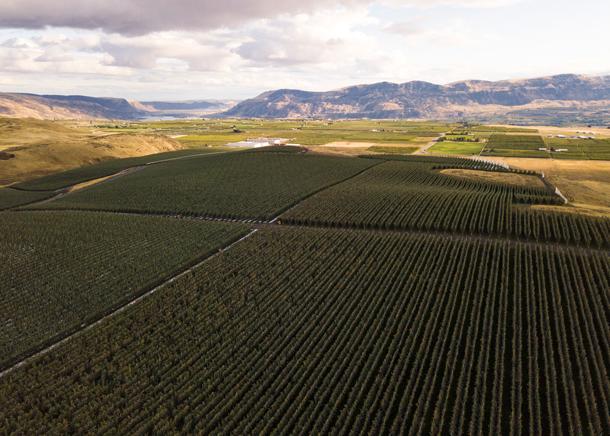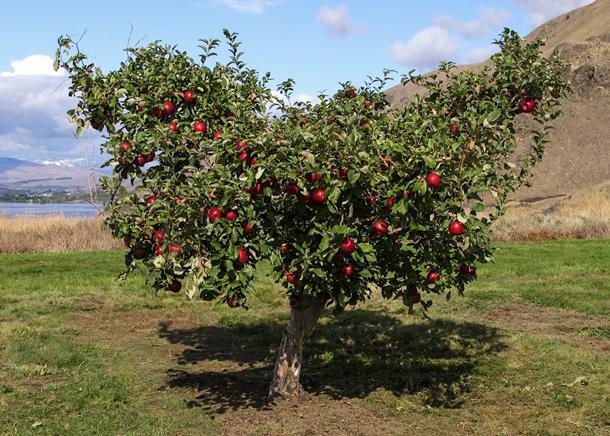The new Cosmic Crisp apple hits stores — after years of development
A Cosmic Crisp apple tree.
A new variety of apple, the Cosmic Crisp, has hit grocery stores around the country after more than 20 years of development by the Washington State University Tree Fruit Research Commission.
The Cosmic Crisp is a cross-breed of the popular Honeycrisp and the Enterprise. Its breeders hope it can combine the most desired apple qualities: great taste, easy growing and harvesting and a long shelf life.
Related: Will Iowa farmers benefit from Trump’s newest deals with China?
Cosmic Crisp growers are taking special care to ensure that the first crop hits the shelves as a winner that matches the hype.
“This certainly, I think, has an opportunity to have some broad-based appeal and everybody’s pretty excited about it,” said Aaron Clark, vice president of Price Cold Storage in Yakima, Washington, and a fourth-generation grower. “I am, too, but we’ll see.”
Price Cold Storage has planted about 80 acres of Cosmic Crisp in their orchards, compared to the 2,000 acres of other tree fruit they harvest. While that may not sound like much, Clark says it’s a lot for a new apple, considering it takes upwards of $35,000 per acre to buy and plant new trees.

“It’s like any new thing. … It doesn’t mean that you can just plug some piece of wood in the ground that grows by itself. You still have to manage it horticulturally.”
The Washington State University Tree Fruit Research Commission has been breeding Cosmic Crisp since 1997. Ines Hanrahan, the commission’s executive director, said that compared to its genetic parent, Honeycrisp, Cosmic Crisp is just as sweet and easier to grow. But growing new apples is not so simple.
“It’s like any new thing. You have to learn how to handle it,” Hanrahan said. “It doesn’t mean that you can just plug some piece of wood in the ground that grows by itself. You still have to manage it horticulturally.”
That’s why the research commission spent weeks teaching growers how Cosmic Crisp matures on the tree. If you take a bite out of a Cosmic before harvest, it tastes and looks like it’s right for picking. But Cosmic Crisp matures slowly, which means growers have to rely on an iodine solution to see how much of the starch stored in the apple through photosynthesis has been converted into sugar.
When they spray the solution on the apples, the sugars turn dark. Too much sugar, or not enough, means the apples might not store as well as they should. And Cosmic Crisp can run into more serious challenges if not managed well from the start.
According to WSU researcher Bernardita Sallato, the variety is vigorous, meaning it can grow quickly in most soil. But that also means it can grow too quickly. If not fertilized properly, mismanaged trees can develop something called “blind wood,” a condition in which some branches do not develop buds or spores — and consequently, no fruit.
Sallato said most growers have avoided blind wood because its cause and remedy are well known. Older apples like Granny Smith and Fujis also suffer from it. Other issues are harder to manage, however, because they’re not as well understood by science.
Take “green spot,” a cosmetic defect that doesn’t change the taste of Cosmic Crisp, but could make it harder to sell. Sallato said it is probably just like “bitter pit” in Honeycrisp, caused by a calcium deficiency, but she’s not yet sure. She and other WSU researchers are looking into its causes.
Related: Low coffee prices are starving farmers. Can a cartel fix it?
Aaron Clark, of Price Cold Storage, said he hasn’t seen any of these issues, but experience has taught him that challenges are a natural part of taking an apple from the lab to the orchard.
“There’s a big difference between test blocks and places that WSU would do and commercial farming,” Clark said. “It’s a lot of trial and error. It’s just planting it and seeing where it goes.”
This report from Enrique Perez de la Rosa aired on Living on Earth from PRX, courtesy of Northwest Public Broadcasting.
